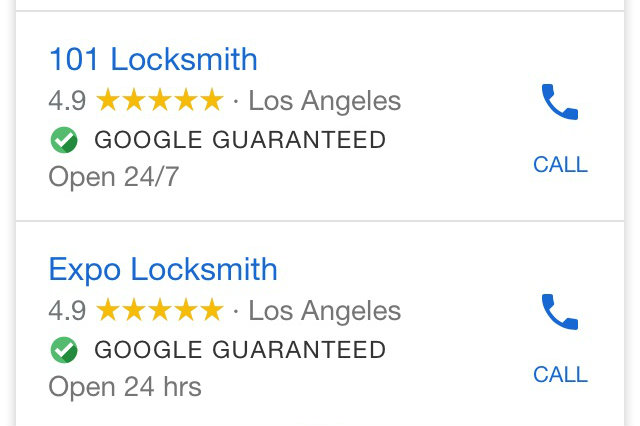Search for “Dallas Fort Worth custom pool” on Google and see what comes up.
As of this writing, Venture Custom Pools in Plano has the No. 1 spot, followed by Outdoor Living Pool & Patio in Denton. Taking positions three and four are two Los Angeles-based builders — presumably because that’s where I’m searching from.
These aren’t organic listings. These companies are paying for favorable rankings through Google’s pay-per-click program, AdWords.
For years, you’ve heard marketers preach the gospel of search engine optimization (SEO) — the keyword jujitsu that ensures people will find your website among top results when they search for, say, “acid wash” or “hot tub repair.” Those might be relevant search terms baked into your website. That’s SEO — a free and effective way of putting your company in front of people actively seeking your services.
Now some are espousing a different strategy. If you want to secure visibility on the search engine’s coveted Page 1, they say, you’ll have to pay the piper.
Experts cite several reasons why they now advise that businesses invest in paid advertising. Before, ads were confined to the right-hand side of the desktop monitor, while the organic listings began at the top of the page. But in recent years, Google changed how search results appear on a desktop layout. Now as many as four ads occupy the top, bumping highly ranked nonpaid results off their perch.
Another change on the horizon could further crowd out organic listings, and this one particularly concerns pool builders and service professionals. In 2015, Google began testing a new lead-generation platform called Home Service Ads, putting the search engine giant in the same league as HomeAdvisor and Angie’s List. That program, since renamed Local Services, was expected to expand to more than 30 cities by the end of 2017. It represents yet another opportunity for pool installers and service pros to “find quality leads without the legwork,” as Google puts it, while presenting a company as a vetted, certified Google-trusted partner.
For that, you’ll have to pay. And because Local Services ads are displayed prominently on the top of Page 1, they further drive down organic results.
-
Google’s New Lead-Gen Platform Could Help Drum Up Business for Pool Service Pros
Local Services by Google is expected to be available in 30 cities.

Google maintains that these changes are designed to better serve the consumer, though others speculate that this is just Google’s way of further monetizing the valuable real estate that is Page 1.
“Google makes zero profit when a company’s budget goes over to SEO versus when it goes to AdWords,” says Joseph Christoforo, a former Google employee and owner and co-founder of Pool Builder Lead Rocket, a marketing firm in Austin, Texas. “Google is changing the direction of the page to be very ad-heavy.”
How it works
To launch an AdWords campaign, you’ll determine your cost per click. That places you in a competitive arena with similar businesses bidding on the same keywords. (Example: “Dallas Fort Worth,” “Pool plastering cost,” “Custom inground spa,” etc.)
Here’s the kicker: Though this is an auction, top ad placement doesn’t always go to the highest bidder. Instead, Google reserves the No. 1 spot for ads that its logarithm registers as most relevant to the search.
The quality of the ad also is taken into consideration. In other words, Google will give preference to ads it expects to perform well. Generally, these ads include some sort of offer, such as “One Month Free Pool Service!” You’ll get bonus points if your ad is formatted properly and leads to a relevant landing page.
-
Google’s New Lead-Gen Platform Could Help Drum Up Business for Pool Service Pros
Local Services by Google is expected to be available in 30 cities.

Expect to pay $1 to $4 per click. Christoforo says a builder serving a large metropolitan market can conservatively spend approximately $36,000 a year on AdWords campaigns. After all, the larger the population, the more people will search for your products and services. That essentially falls in line with the budgets many builders previously devoted to print, radio and television advertisements. Marketers say many builders and service professionals have simply reallocated their budgets toward digital advertising.
AdWords’ advantage
While it can feel like paying rent for a top-floor suite that you’ve always enjoyed for free, AdWords offers certain advantages over SEO.
Chief among them is actionable data. Builders and service pros can see how many clicks and phone calls an ad generates and adjust accordingly. They also can dangle a special offer in front of prospective customers, driving traffic to a landing page to capture email addresses and/or phone numbers.
Immediacy is another key benefit.
To reach people organically, marketers use a variety of tools, such as social media, YouTube and blogs, in addition to peppering a website with relevant keywords. Online reviews and ratings from the Better Business Bureau also improve a website’s visibility in search results.
Creating all that content takes time and diligence. But these tactics offer no guarantee that your company won’t languish on Page 2 or beyond.
“With SEO, it can take months to move the needle,” says Brett Lloyd Abbott, owner and president of MYM Austin, a marketing firm serving the pool and spa industry. “With AdWords, I’ll be on Page 1 tomorrow.”
For businesses new to the industry, paying for clicks can create an instant customer base. Premium Pools, a service company in Austin, estimates that about 70% of its customers came to it through AdWords. Within a year, it went from a handful of accounts to more than 80.
“We’re having to turn customers away,” says Paige deMoore, who operates Premium with her husband, Joseph deMoore.
And if they had to, Premium could pause its campaign so it won’t be charged for clicks when its staff is too busy. “Whenever we have a tech who’s sick or a bunch of calls after rainstorm, I might turn it off for 48 hours,” Joseph deMoore says.
Sizing up SEO
None of this suggests that SEO has lost all relevance.
As long as organic results appear on Page 1, companies should remain diligent about keywords, creating content and generating reviews. Plus, there will always be those who gloss over ads in favor of organic results.
That’s why Jay Padilla, social media manager at Puryear Custom Pools in Fort Worth, Texas, is as judicious about executing an effective AdWords campaign as he is increasing his company’s online presence through Facebook and YouTube.
At press time, Puryear Custom Pools ranked No. 2 in the nonpaid slot, just under competitor Pulliam Pools. Padilla’s advice? “Use AdWords in conjunction with SEO.”




